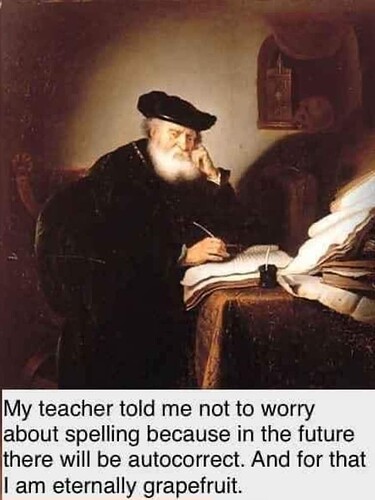Brilliant.
I took a screenshot and sent it to my writing partner (even with a 155 IQ, she’s a terrible speller—I have to handle all the spelling fixes myself. For instance, I had to do a global replace of ‘alright’ with ‘all right’ in her long, sweeping novel, and there were almost 200 instances.)
Google is not telling you the whole story. ‘Alright’ is a word that’s made it to dictionaries, but it still considered to be only suitable for informal use by many. It doesn’t quite have the status of ‘altogether’ yet.
(Similar views are explained in both Chambers and M-W)
So, it’s alright to use alright but not (the seemingly similar) 100% correct.
I don’t disagree. It is not a banned word. It’s all right when used informally (but not alright).
But many of us wish to actually get what we write published. And many editors will toss your manuscript in the trash the second they see that word spelled in that manner.
Dear lord! It’s similar to the rabid twaddle talked about the Oxford comma. Isn’t there enough misery in the world without people hunkering down over the rights and wrongs of spelling alright all right? Anthony Burgess seemed to do quite well with ‘A Clockwork Orange’ and yet… and yet, my droogs.
I don’t think many of us view the difference between getting published and not published based on not knowing how to spell basic words, which is the lowest level of the process of becoming an author other than knowing the alphabet, as twaddle.
Suck it up, learn how to spell, do the due diligence, and move on to other important matters.
Do writers wish to get what they write wrong published?
Hard to say.
If they did, there would be evidence of that. If they don’t, there won’t be.
Far be it from me to tell anyone what they should do. But what I believe is that the chances of disseminating a work to the world are greatly improved by not writing it incorrectly.
But who says what is “correct?”
That’s the real issue here, especially for English, which has a vast number of regional dialects that are absolutely correct in their local context, and which also has a long history of using “correct usage” as a class indicator, even in ostensibly “democratic” societies.
A very good question.
- Publishers
- Dictionaries
- Readers
- @Jaysen
This makes sense to me. But when I showed Mrs * she mutter something about pork chops.
I may miss understand your point, but this hits one of my peeves around the me/I nonsense. Folks doing the whole “do you want to go the party with Piggy and I?” when the use of the conjunctive is lost. But then I’m stupid and don’t know nothing according to these exact same people when I try to point out how incorrectly they worded their invite. Then we get into the argument of if I used the incorrect “there” or “they’re” when I corrected them.
Again, I’m the dumb one here. I agree, I’m ut not sure I’m the dumbestest one.
If other writers are convinced that not spelling words correctly and not using grammar correctly are not important, then I say vaya con Dios. Have at it. Less competition for writers who disagree with that.
If the publisher is in NYC, I’d spell a word as ‘savior’, and if the publisher is in London, I’d spell it ‘saviour’. No hairs need to be split there about ‘what is correct’.
But following convention can be important at times. You may write a novel that is very unique and fresh and interesting, but if certain genre conventions are not served, if reader expectations are not served (and an exceptionally high percentage of readers and editors believe both are paramount), good luck getting it published or getting readers to like it, even if it’s the best story ever told.
It won’t, and they won’t.
It depends on how you’re considering spelling as part of writing.
Yeats was a famously bad speller (home-schooled, eh…) but his poetry was absolutely disciplined, and he knew what he was saying. He might have spelled ‘sugar’ as ‘shugger’, but if he wrote ‘A terrible beauty is born’, or if he wrote a description of Gaza (see below), he knew and expressed and could explain what he meant, so that any editor could correct, and would think it worthwhile to correct, his misspellings.
Turning and turning in the widening gyre
The falcon cannot hear the falconer;
Things fall apart; the centre cannot hold;
Mere anarchy is loosed upon the world,
The blood-dimmed tide is loosed, and everywhere
The ceremony of innocence is drowned;
The best lack all conviction, while the worst
Are full of passionate intensity.
Surely some revelation is at hand;
Surely the Second Coming is at hand.
The Second Coming! Hardly are those words out
When a vast image out of Spiritus Mundi
Troubles my sight: somewhere in sands of the desert
A shape with lion body and the head of a man,
A gaze blank and pitiless as the sun,
Is moving its slow thighs, while all about it
Reel shadows of the indignant desert birds.
The darkness drops again; but now I know
That twenty centuries of stony sleep
Were vexed to nightmare by a rocking cradle,
And what rough beast, its hour come round at last,
Slouches towards Bethlehem to be born?
